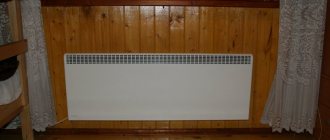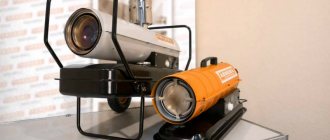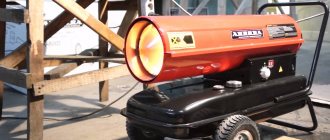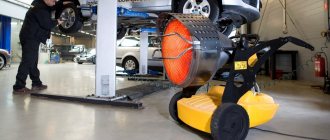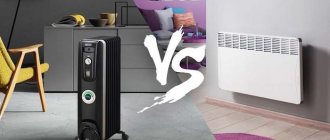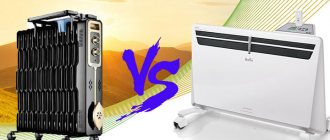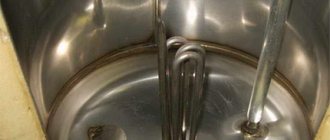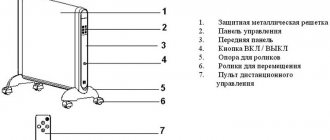In order to choose the right equipment, you need to accurately determine for yourself whether a fan heater or a convector is better, and make a purchase based on the conclusions drawn. Each type of equipment has its own positive and negative sides, and it is also necessary to take into account the conditions in which the selected units are expected to operate. You have to choose between:
- Fan heaters,
- Infrared heaters,
- Oil radiators,
- Heat guns,
- Convectors.
And not only the temperature in the room, but also the safety of equipment operation will depend on the accuracy of the choice.
What to choose: heat gun or convector?
When the analysis begins on the topic: fan heater or convector, which is better, the strengths and weaknesses of each type of device are weighed. Heat guns are based on a fan of a certain power that moves warm air at high speed.
The power of such equipment starts from 5 kilowatts, so the devices are quite powerful and productive. The devices are most widely used in construction. In particular, in such facilities where there is no possibility of connecting to electrical energy, but it is necessary to maintain optimal temperature conditions or it is necessary to dry the wall.
The convector does not have an element that forcibly moves air, and this unit uses heating elements of various capacities, and the heated air masses exit the housing through special grooves.
Fan heaters have more power and are able to heat the space in a short time, thanks to the intensive operation of the fan and heating element.
It is important to choose a device with an increased safety system and the ability to turn off in case of problems with the hot air supply. If you need to choose and the question arises, which is better, a heat gun or a convector, then you need to take the purpose of using the equipment as a basis.
Convectors are more convenient and compact, and they cause minimal harm to others, so they can be installed in a residential area. Heat guns have enormous productivity, but are undesirable for residential premises, except during renovation work.
How does a heat gun differ from a fan heater?
The body of heat guns is more durable - metal, while fan heaters are usually made of plastic. In essence, a heat gun is a more powerful version of a fan heater and can already be used as an autonomous heat source.
A closed-type heating element is used as the heating element of heat guns: a spiral placed in a metal case with high thermal conductivity. A more powerful fan forces air into the inside of the case, passing it through the heating element and dispersing it throughout the room. Mobile portable heat guns have a thermal power of 2-16 kW, stationary ones - up to 30 kW.
The difference between heat guns is that they can operate not only on electricity. Special models have a gas or diesel burner placed in a combustion chamber through which air passes. Heat guns, regardless of power, can work for days, maintaining the required temperature not only in a closed, but also in a semi-open room (if the device has enough power).
Design of models running on gas or diesel fuel.
Portable models are smaller in size and weight, and have comfortable handles on the body. Most heat guns are well protected from moisture and corrosion, so they can be used in places with extremely high humidity. Some models have special mounts on the body for wall mounting.
Due to their higher power, heat guns produce 2-3 times more noise. Gas and diesel products burn oxygen and emit harmful substances formed during the combustion process into the air, therefore they are not recommended for use in small enclosed spaces.
What's better?
Oil radiators are capable of heating large areas, and their safety level is high enough that this equipment can be turned on for several days without additional control.
Such devices operate silently, they are reliable and environmentally friendly, which also speaks in favor of oil radiators. But still, a fan heater or an oil radiator, which is better? This question can be answered if you know the advantages of the device, among which stand out:
- The rate of heating of the surrounding space,
- Small overall dimensions, which means mobility,
- Use at any time of the year as a heating or cooling element,
- Relatively low cost.
So in the end, you need to determine whether a fan heater or an oil heater is better, depending on the area of the room, financial capabilities and period of use of the device. Oil radiators are convenient to use in rooms where excessive noise is not desired and a high degree of safety is required. This could be a bedroom or a children's room.
Design and principle of operation of convectors
A convection heater works on the principle of heating the air through the process of natural convection. Cold air enters the device through the grille located at the bottom of the product. The air flow then passes through the heater, becomes warm and exits through the top grill, distributing it throughout the room. Floor and wall models are available, as well as combined and built into the floor.
Convectors are often used to heat and dry bathrooms. When choosing a model for rooms with high humidity, take into account the electrical protection class of the device (preferably the second one), as well as the moisture protection class - IP24.
Compact convector heaters are located on the wall a few centimeters from the floor, which provides better heating of the air in the room
Convector heaters also have many advantages: long operating time of the device; quick heating of the air flow; two ways to install the model: floor (has wheels) and wall (has a fastening element); the presence of built-in thermostats that allow you to set the desired temperature level in the room; the ability to combine several products into a network, allowing for complete heating of the house; operational safety; noiselessness; small dimensions and original design.
The only drawback of convectors is that they do not heat the air in the room quickly enough to the desired parameters. This is due to the modest capabilities of natural convection.
Compact models of floor convector heaters are equipped with small wheels that facilitate their free movement around the room. If necessary, can be easily moved to another room
Here's what we can recommend from manufacturers:
When choosing convectors, pay attention to the products of the following manufacturers: Electrolux, Ballu, Timberk, Noirot, NeoClima, Nobo, Polaris, Stiebel Eltron, ADAX, Termor. Models with electronic thermostats are able to control temperature changes with an accuracy of 1°C. Select a heater based on power, which can range from 0.25 to 2.5 kW. Pay attention to the heating temperature of the case. Models whose body heats up to 55 °C are suitable for children's rooms. So, having become more familiar with these types of heaters, you can make an informed choice
If you intend to use the device for quick and short-term heating of the room, then choose a fan heater. If you know that the equipment will have to work for a long time, then buy a convector. Once you understand whether you need a fan heater or a convector, decide on a specific model. To do this, carefully study the technical characteristics of the products sold by the manufacturer.
So, having become more familiar with these types of heaters, you can make an informed choice. If you intend to use the device for quick and short-term heating of the room, then choose a fan heater. If you know that the equipment will have to work for a long time, then buy a convector. Once you understand whether you need a fan heater or a convector, decide on a specific model. To do this, carefully study the technical characteristics of the products sold by the manufacturer.
Choosing between a heat gun and a fan heater
If the choice of whether a fan heater or an oil-type heater is better is more or less clear, then heat guns and fan heaters have almost the same operating principle, and difficulties may arise when selecting equipment.
But there are several distinctive features of a heat gun from this device, and they consist in greater intensity and high power of operation. If the consumer is interested in the question: which is better, a heat gun or a fan heater, then for large premises that are non-residential or temporarily non-residential, the first option of equipment is suitable.
More on this topic on our website:
- Which water heating batteries to buy - choosing bimetallic radiators Manufacturers of heating equipment offer various types of heating devices. It is quite difficult for an inexperienced person to decide which water heating batteries to buy. The choice is often made in favor of the radiator design...
- There are various options for electric home heating. But, in addition to the variety of existing options for heating systems using electricity, there are a number of factors that need to be understood. Electric heating at home...
- Most of those who build private houses think about heating their home and there are many options on how to heat your home, but they are still interested in the question...
- Electric current not only provides lighting in country houses and cottages, but also serves as a source of energy to power devices such as wall-mounted fan heaters for the home...
Comparing operating principles
A fan heater or heat gun transfers heat using indirect heating. That is, the fan heater heats the air, and the heated air heats the surrounding objects. Obviously, warming up this way will take more time.
Comparison with a heat gun
The IR heater uses direct heating. Infrared rays or thermal radiation directly heat objects that surround the heater.
IR heaters are available for wall, floor and ceiling. Infrared heaters can also be used for local heating in a large room. But, it is worth remembering that a person’s long stay in front of an IR heater causes discomfort and dryness on the skin.
Also, the temperature of the heating element of an infrared heater is very high, so its use in rooms with a high fire hazard is not recommended.
What do fans look like in the interior?
Among the disadvantages of the fan heater, it can be noted that it dries the air and creates noise during operation
Therefore, when choosing a model, pay attention to the noise during operation. Modern medium-power models should have a noise level no higher than 25-30 dB
Both types of heating devices are best used in rooms where people are not constantly present. For example, a warehouse, utility room, garage, etc. We talk about choosing a heater for the home in the corresponding article: “Choosing a heater for the home.”
Below in the table we have summarized the main advantages and disadvantages of both types of devices.
| Fan heater vs infrared heater | |
| Flaws | |
| Noise | Dries the skin and mucous membranes |
| Dries the air | High temperature of heated surface |
| Potential fire hazard | |
| Advantages | |
| Low cost | Feeling of natural warmth |
| Warm-up speed | Possibility to warm up part of the room |
| Can be used outdoors |
INFRARED HEAT GUNS
Using infrared lamps, the gun heats the surface it is aimed at.
Pros:
- Fast Heating
– The infrared gun only takes a few minutes to heat up the point it is aimed at. - Silent
– the infrared gun does not make sounds during operation. - Eco-friendly
- the unit does not pollute the air and does not create unpleasant odors.
Minuses:
- Only local heating
- an infrared gun does not heat large rooms well. - High heating temperature
- it is undesirable to leave the gun unattended. The temperature at the heated point can rise to 200°C.

